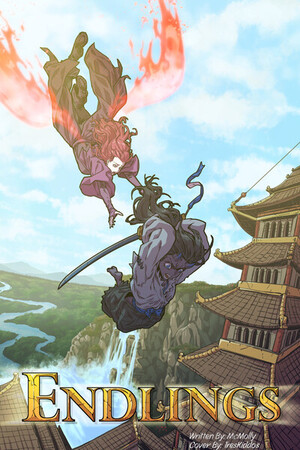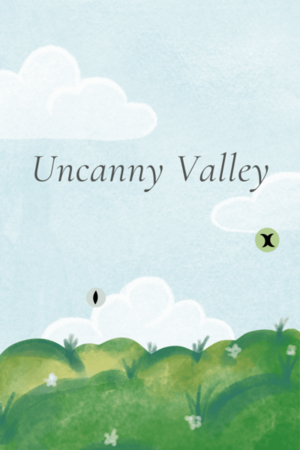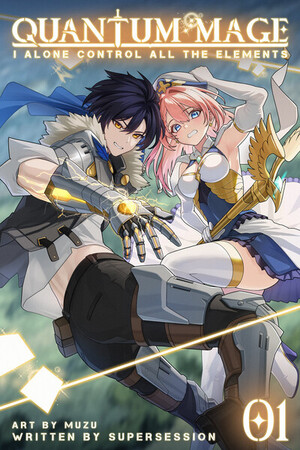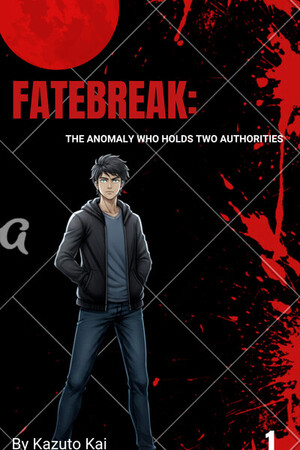Chapter 5:
Chapter 5
Endlings
It was, to be a bit more accurate, the underside of a goddamn island. Not a discrediting distinction, but it comes with an unfortunate degree of obscurity, since there’s not much you can tell about an island from underneath it without some sort of degree in islandography.
They saw little more than dark earth and jagged rocks, all blended together and tapering to a point like the base of a spinning top. Of course, the mundane is only mundane when it’s where it ought to be. Miles of dirt and rock aren’t worth much of a look when they’re on the ground, but put them in the sky, and suddenly it begins to feel like you’ve left your world behind.
Which, appropriately enough—
“Bina…”
“Yes, again?”
“That’s not Totono.”
“I believe you,” said Bina, who would under no circumstances look down to verify that claim. Instead she looked up, which was a sort of loophole to her acrophobia. The ground was getting closer, but it was from the wrong direction, so it didn’t count.
There were several chutes in the island’s belly, little stone apertures, from which drifted mist that thickened as it floated away, and could, she thought, congeal into suitably cloudy mass if there were enough of it. The rumbling of thunder sounded more like distant drumming now, and the rain, rather than evaporate with the clouds, dripped weakly from the island like a leaky faucet.
They ascended into a larger opening in the apex of the taper. The darkness became much thicker and more musty as they passed through a hollow column of earth, then a brief stone passage, and finally, into a room.
Light, then.
Not sunlight. They were indoors, or inislands, and so despite being a dizzying ways above the earth, they were, technically speaking, underground. Firelight from a handful of lanterns defined the far-flung walls, but did little to illuminate the shadowy mass between them.
The anchor came to a jerking stop, its chain vanishing into some coiling mechanism built into the ceiling. There was floor around them, at least, and they both flung themselves onto it before the anchor got any ideas about an encore.
They waited several seconds for something awful to happen. Nothing did, perhaps out of spite.
Bina expected to be frigid and winded. She reached instinctively for her inhaler, then stopped, and considered the fact that she wasn't gasping for air, and the iron cage around her lungs had slackened off.
She was damp, uncomfortable, but aside from the fear-tremors she felt rather hale.
So she busied herself with their surroundings. She squinted into the dark, pulling out rows of shapes with ill-defined edges. Things that rose almost to the ceiling, and might be narrow but might also be fat and simply made of many narrow things. There was movement, but the mechanical kind. Chunking, repetitive, metronomical. Water sloshed, steam hissed, air whooshed and then was cut off.
She got the sense they were in a work of some sort. Steelwork, woodwork, waterwork. There was no telling like this, and no point guessing. Frankly, she didn’t know if she wanted to find out. Moving at all seemed like a controversial decision.
Renko, ever the controvert, got to her feet and looked around. Miraculously, she had managed to keep the sword attached to her hip through the whole ordeal. Even in the dark Bina could sense the itch in her fingers to use it.
“Wait,” she said, and because that wasn’t particularly helpful, she added, “We should be careful.”
“Just gonna look around,” Renko said.
“Yes, just—carefully.”
They moved in tandem, Renko leading with a hand on the sword, Bina wringing out her hair and leaving a snail's trail of water behind.
One of the shapes they approached was a cylinder of wood with metal bracing, like a barrel trussed up with steel rope. Heat radiated from it, and the wood sweated and seemed to swell against its bindings every few moments, before exhaling and settling back into place. Beside it was a turning waterwheel, and at the end of each spoke was a deep bucket, almost a trough, which would fill with water from a pipe in the ceiling and then be dumped into an intake near the top of the barrel.
Further in, great metal drums were laid into the floor, larger around than a car and clustered together in groups of three or four. Above them hung suspended mechanisms of wood and iron that looked, to Bina’s adjusting eyes, like very large, piston-y drumsticks.
Scarcest of all the room’s oddities, but also the most attention-grabbing, were a handful of glass orbs hanging from the ceiling. Light flickered and leapt around inside with acrobatic flair, moving in narrow bolts and staticky warbles. Funnels at the base of the globes spiraled down into the floor, and presumably, like everything in here, out the bottom of the island.
“What is all this junk?” Renko asked, rapping her knuckles against the glass. Faint buzzing filled the air as little motes of shock danced through to her fingers, tiny and ephemeral. She pulled away with a grimace. “Looks dangerous. Like this whole place is a weapon or something.”
“Or something...” mumbled Bina.
“That monster’s gotta be here somewhere.”
“Somewhere...”
“Maybe it’s hiding. Maybe it saw us coming somehow.”
“Somehow...”
Truthfully, Bina was only half listening. She had broken from Renko’s shadow and begun to explore trepidatiously, first with her eyes and then with her feet and hands, caught perpetually between the allure of curiosity and the fear of what it did to cats.
She crouched down to tap one of the metal drums. It made a thin but satisfying sound, like a sprinkle of rain on a tin roof. She felt the barrels of water breathe, listened to the sloshing inside quickly vanish into hissing and whooshing. She traced a finger down the glass funnels and watched with fascination as the electric light followed along, warming her fingertips and making her scalp prickle.
“I think this is where the storm came from,” she said at last.
“What?”
“I think they made it here.”
Renko pulled a face, the doubtful kind where the lips try to touch the eyebrows. “Made it?”
“Like, uh, you know…” she whirled her hands to conjure an answer. “A soup?” she finally decided. “They’ve got all the ingredients, I mean.”
Renko stared at her, determined to discount the idea as stupid. Unfortunately, she could not at gunpoint have explained how a proper storm actually came about, and anyway, the storm that had hit Totono was anything but proper.
“Okay,” she said. “So?”
A perfect parry; Bina had no response. She just shrugged. “It’s weird?”
Renko gestured broadly, to everything. “No shit.”
“Renko, the monster flies, lives on a floating island and can make storms,” Bina said. “You’ve got a sword, and I’ve got…” she patted herself down, paused, and pulled grandpa’s lighter from her pocket. She couldn’t believe it was still there. She put it back. “…and do you even know how to use a sword?”
“It’s only got one edge, how hard can it be?”
Bina didn’t have a frame of reference, really. Renko watched more anime than she did, and was much more athletic. She supposed between the two of them, it was better that Renko had the weapon, but the idea of her fighting anything brought up a fearful panic in Bina that had to be stomped down with both feet.
“Look, don't even start,” Renko said impatiently. “We're already here, so we're doing this. Just stay behind me, and if something show’s up you—”
A wide set of double doors on the far side of the room flew open.
“—Hide!”
Renko pulled them deeper into the room’s pitch, behind one of the steam barrels. Bina hunched low and peeked around at the light spilling in, and the figures it silhouetted.
There were two of them; one was tall and lanky, the other so short and round she thought it might be a ball with legs. They shut the door behind them and the room was dark again.
“Right,” said the short one, a little black blob in the dark. “I’ll get the storm going.”
“I can do the rumblers,” said the tall one.
“No, you check the anchor.”
“I don’t like checking the anchor. It went loose last time; I fell all the way into the Loop and ended up in a tree. The birds don’t like surprises like that.”
“Well,” the short one said. “Now you know what not to do. You been here long enough, you ought to have known already, so, served you right.”
“But it’s come up just fine, hasn’t it? You can see it right there.”
“The lady said to check the anchor, and I say it’s you who checks it.”
“But—”
The short one huffed. He had a low, grindy sort of voice that brooked no arguments. “Anri,” he said, and somehow made the name sound like a threat.
The tall one made a noise like a scolded puppy and broke away from his companion. Bina felt a small pang of sympathy for him, and just a bit of relief. It was nice to know that, wherever they were, they still had the fear of heights here.
Renko tapped her shoulder. Bina was proud of herself for not shrieking.
“Up,” she mouthed, and nodded to the top of the barrel.
She crouched down and cupped her hands. Bina stepped onto her palms, ready to scramble her way halfway up, but to her surprise Renko managed to hoist her on top with ease. Though, maybe not so surprising given what happened on the anchor. Maybe she should have been happy she wasn’t thrown full speed into the ceiling.
She leaned over to offer a hand, but Renko had backed away into a darker patch of wall. Footsteps. The short shadow rounded the barrel with a lantern. Bina slunk back from the edge, just enough to still peek over it.
Her guess hadn’t been far off. He wasn’t a ball with legs, he was a short, round tea kettle. With legs. Little iron sticks with flat feet, and arms sprouting from the sides like broken handles. He even had a face; a spout for a nose, a little grate underneath it for a mouth, and carved holes that she guessed must have been his eyes. He was bigger than a normal kettle, of course, but still couldn’t have come up past Bina’s knees.
She watched in fascination as he tipped his head—body? Face?—into a slot at the barrel’s base and poured in water from his spout—nose? Facial appendage?
The barrel heaved an unimpressed sigh beneath her.
“Dammit,” said the kettleman. “Anri! Where’s the nebulizing solution?”
“I thought you brought it?” the lanky shadow called from across the room, where the anchors chains rattled.
“Why would I bring it?”
“…Because it goes in your body?”
The kettleman grumbled. “Some muleboy you are. Oughta get you sent back to reception.”
“Could you?”
“Make yourself useful and check the barrels for leaks, there’s water everywhere. I’ll be back with the stuff you should’a brought in the first place.”
“Yes, sir...”
Bina recoiled as the kettleman clanked away, cursing her still-damp hair and dripping clothes. She listened as the tiny, metal footsteps retreated back the way they came, waited until the doors opened and shut, and then exhaled.
As quietly and as delicately as she could, she crawled to the barrel’s edge and crept over it. One foot then the other, firm grip on the top, lowering herself on arms still sore from holding on to the anchor. Her feet couldn’t quite reach the ground, so she took a deep breath, hoping to make herself as light and airy as possible, and dropped the last few feet.
To her surprise and immense relief, she fell like a feather, and made nary a sound as she landed upon the stone. It was like she’d been gently lowered by a guiding hand.
Now she just needed to hide.
“Oh, hello.”
She whirled to find the lanky shadow there, deshadowed by the lantern the kettleman had left on the ground.
The shock went both ways.
For Bina, what she saw was a man, conceptually. By design, scarecrows were meant to look like people, so he had the requisite limbs assembled in the appropriate way to resemble a tall, gangly man. But his baggy pants cut off at the shins, where wooden poles stuck down into floppy boots, likewise with his shirt whose sleeves were filled with carved planks that fit into leather gloves. His head was a sack, from which sprouted hair of hay that had been combed and swept into a decent do. A long wooden nose, stitched lines in the cloth for a mouth, and two shiny metal discs for eyes, within which she could see a pristine reflection of her own terror.
For the scarecrow, what he saw was a perfectly average girl with hair that was perhaps too red, but he wasn’t one to keep up with fashion and he certainly wasn’t going to judge. The issue came when he looked into her eyes, and saw the fire in them, flicking, whirling, hungry, and entirely out of place on her otherwise friendly if terrified face.
They screamed in surprisingly good harmony.
Then the point of a sword burst through his hay-filled chest, and they both went quiet. He blinked, looked down at himself, and made a confused noise.
“Well that’s interesting.”
And then he was gone, vanishing in a warp of light and a hissing of air.
There stood Renko, holding the sword up with great effort as though it suddenly weighed a hundred pounds.
“You okay?”
Bina checked to make sure she still had a pulse. “I-I think so.”
“What the hell was that?”
“I don’t know. He looked like a scarecrow. Was that what hit the house?”
“No,” Renko said. “Didn’t see any claws or wings. Besides, that freak was too tall.”
“Well that’s a bit rude,” said the sword. “Coming from an oni of all things."
Renko and Bina’s screams were not as harmonious.
The sword clattered to the ground and they jumped back. Renko put up her fists. Bina, whose fists were more for decoration, produced her grandpa’s pipe and held it out with both hands like the world’s deadliest letter opener.
The sword was not intimidated.
“Hello?” it said. “I’m sorry, I didn’t mean it. Could you come back?”
They scooted closer, craning their necks out to peer down at it from as far away as they could manage. The blade was shiny, even in the dark, like a sliver of moonlight. On it, or perhaps inside it, was a perfect reflection of the scarecrow.
“Oh, there you are,” he said. “Please don’t drop me again. It’s a little disorienting.”
“Bina the sword is talking.”
“I know.”
“The sword isn’t talking,” said the sword? “I’m talking.”
They shared a hesitant glance, a telepathic game of rock paper scissors which occurred in the span of an instant and was won by Bina. Renko inched closer.
“Who…” she started. “Uh, what, are you?”
The scarecrow tilted his head, as if she’d just asked him why the sky was blue, or whether it was wasteful not to eat the shell of an egg.
“I’m Anri,” he said. “I’m dead, of course.”
“Of course?”
He nodded. “We’re all dead.”
“We’re not dead,” Renko insisted, just a little less confidently than she should have done.
Anri nodded again, and stepped closer so that just about all they could see were his eyes. “No, you’re not, are you?” he said, and all that terror and meekness shriveled up for a kind of curiosity Renko found headachingly familiar. “Isn't that strange.”



Please sign in to leave a comment.